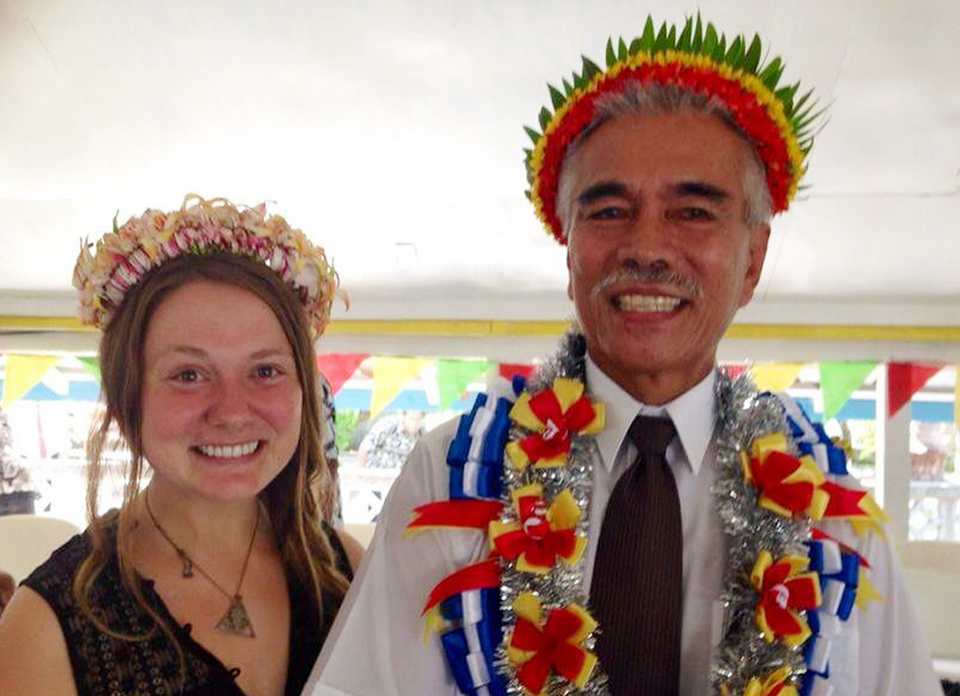
Cantieri with Kiribati President Anote Tong. She met Tong at a village meeting during her five weeks covering how climate change is impacting his island nation.
Chicago to Seattle. Seattle to Hawaii. Hawaii to Christmas Island. Christmas Island to Fiji. Fiji to South Tarawa.
It took four days for Janice Cantieri, a senior in Arts & Sciences, to travel to the capital of Kiribati, a nation of 33 low-lying islands and coral atolls scattered along the equator.
There, Cantieri found wells flooded with seawater, uprooted coconut trees and seawalls that are washed away daily. She also found resourceful and resilient communities working to beat back climate change’s relentless advance.
“They adapt every single day,” said Cantieri, who is majoring in International and Area Studies. “The people were the most welcoming I’ve ever met in my life and, somehow, among the most optimistic.”
Cantieri traveled to Kiribati as a student fellow for the Pulitzer Center on Crisis Reporting with support from Washington University’s Office of Undergraduate Research. On Friday, April 17, Cantieri and dozens of students will present their work at the Undergraduate Research Symposium. Opening remarks and keynote address will be at 4 p.m. Friday in the Laboratory Science Building followed by poster presentations at Olin Library.
Cantieri was inspired to study in Kiribati after taking the class “Global Energy and the American Dream” with Bret Gustafson, PhD, associate professor of anthropology in Arts & Sciences.
“That class introduced me to the whole way environment and climate change more negatively affects developing countries,” Cantieri said. “The class, frankly, really depressed me. And then I hear about this country — these people are among the poorest in the world and their country is facing sea level rises that will wipe them out in probably 50 years. I needed to learn more.”
Despite its remote location, Kiribati has been the subject of numerous dispatches by leading news outlets. But what these stories missed, Cantieri found, was “the human voice.”
So Cantieri interviewed dozens of everyday citizens, transforming their stories into a series of articles and videos published on the center’s website. She met one couple who installed a rainwater tank to replace a contaminated well; a schoolteacher who has created new, sustainable jobs through her organic coconut oil operation; and a local official who is teaching neighbors how to build natural seawalls from shrubs and coconut leaves.
“I know that, as a reader, I connect more when there is a human voice,” Cantieri said. “Once you know their stories, you can’t just say, ‘Well, that’s in some island, in the middle of the ocean.’ ”
During her five-week stay, Cantieri lived with two host families. She showered outdoors with a bucket, ate a diet of breadfruit, coconut and pumpkin, and slept in an open-air platform supported by stilts. There was a thatched roof but no walls.
“Every time it would rain, my host mom would get up and tie thatched mats up to block the rain and wind,” Cantieri said. “The tropical storms could get pretty intense.”
Cantieri stays in touch with her host families through email, and would like to return to continue her research after graduation. Ultimately, she would like to do more immersive reporting or humanitarian aid work in other corners of the globe. Where others may see crisis, Cantieri sees hope.
“When you see all of these big, big problems in the world, it’s easy to give up and say, ‘We’re all sinking,’ ” Cantieri said. “But the people in Kiribati aren’t giving up. They are doing small things. Hopefully, stories like that theirs will inspire others to do small things in their lives to help.
“I don’t want people to give up.”